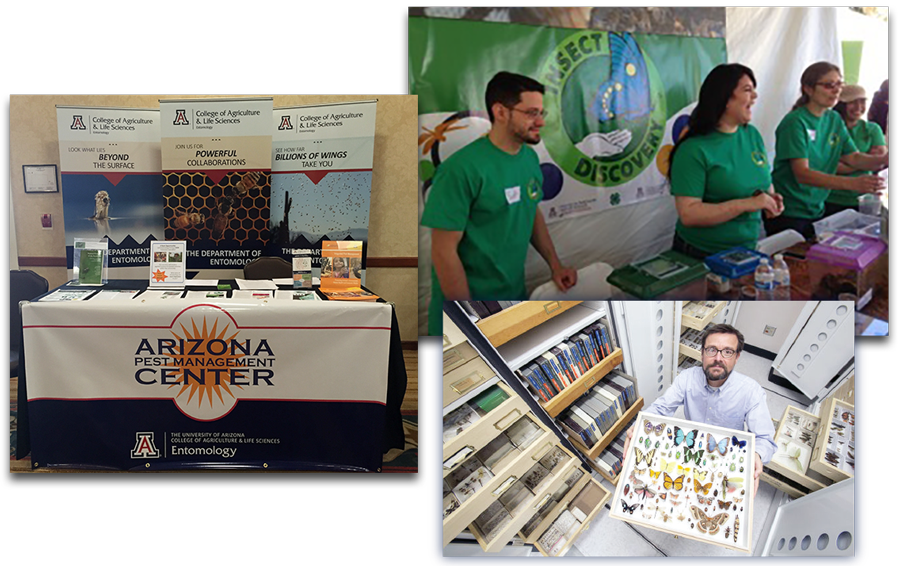Besides the main campus, the university has agricultural centers where work on agriculturally important insects is carried out:
The Campus Agricultural Center is located about three miles north of campus and is situated in and around the USDA facilities serving many of the departments within the College. Two research laboratories plus several greenhouses are located on the farm that specifically serve agriculturally-oriented research by several faculty and their graduate students. Farm land is available for specialized small-plot field research.

The Maricopa Agricultural Center (MAC) is located about 75 miles northwest of Tucson and comprises the largest and most modern research facility among the off-campus farms. The entire farm of 2550 acres is divided for both large-scale demonstrations and large-plot research. Numerous agricultural and horticultural crops can be grown for the researcher upon request. Excellent modern laboratory and greenhouse facilities are also located at this station.
The Yuma Agricultural Center (YAC) is in Yuma, Arizona, about 250 miles west of Tucson. The YAC has two sites: a Valley farm four miles west of Yuma and a Mesa Farm four miles south of the city. The 274-acre Valley Farm includes a diversified range of crops, including cotton, small grains, and such vegetables as lettuce and broccoli. The 240-acre Mesa Farm is focused on citrus production.
The Citrus Agricultural Center, located in Waddell, Arizona, about 140 miles northwest of Tucson, is used mainly for research but also to demonstrate the latest varieties and methodology in growing and maintaining citrus, deciduous trees and vine crops. Research includes variety evaluation, nutrition, water use and requirements, frost protection, rootstock evaluation, pest and disease control, organic growing methods, and dwarfing techniques.
The Marana Agricultural Center is located about 30 miles northwest of Tucson and is devoted mostly to research with agronomic crops. Faculty/staff from the main campus utilize this farm for field research.
The Safford Agricultural Center is located in eastern Arizona, approximately 130 miles from the main campus. The higher elevation makes this an ideal place for research on crops adapted to the high desert region.
In addition, there are special reserves where insect ecology in natural habitats may be conveniently studied:
The Santa Rita Experimental Range (40 minutes southwest of Tucson) was recently acquired by the University of Arizona. The range encompasses a large acreage on the western slopes of the Santa Rita Mountain range. The Range is the site of current research especially on termite ecology and the biology of range insects. The Florida Canyon Work Station (a biological field station) provides laboratory space and accommodations for University of Arizona and visiting biologists. Florida Canyon is an excellent example of an interrupted canyon stream and mountain canyon riparian habitat where research on native cotton insects, gall forming insects, and the ecology and behavior of aquatic insects is currently being conducted.
The Desert Laboratory was established at the turn of the century by the Carnegie Foundation for the study of desert plants. Saguaro cacti and other dominant perennial Sonoran Desert species have been monitored on site for over 80 years. There are laboratory facilities for personnel at the University of Arizona and for visiting researchers on site.
The Boyce Thompson Arboretum, north of Tucson at Superior, has an excellent facility for research with arid land plants.
The Sonoran Desert Station for Arthropod Research now being established in the Tucson Mountains will provide a natural preserve for research and instruction very close at hand. The Sonoran Desert Station for Arthropod Research consists of about 300 acres of pristine lower Sonoran Desert land of variable relief and exposure in the foothills of the Tucson Mountains. The reserve is bounded on the south and west by county park land and by the Saguaro National Monument. Desert Station is administered by the Department of Entomology. This is a restricted access site for long term ecological studies and approved non-destructive, minimally intrusive biological research. No facilities are currently available on site, but the location is only 20 minutes from the University of Arizona campus.


